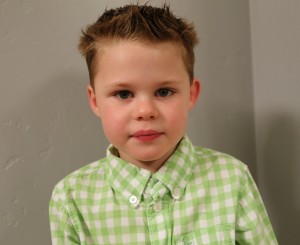Connor Campbell is 6 years old and doesn’t sleep through the night. He is nonverbal and isn’t potty trained. Although he can’t talk, he can communicate.

“He totally doesn’t talk, but he can hum any song he’s ever heard,” said Emilie Campbell, Connor’s mom. “He’ll latch onto a song that he’s heard once and be humming it the whole week. He loves Primary songs and Neon Trees songs.”
That may have something to do with dad Branden, bassist for the Neon Trees. When Branden Campbell is on tour, Emilie and older sister Katie are at home with Connor, who wakes up around 10 times a night with seizures. He suffers about 100 seizures a day, causing developmental delays.
A new treatment from Colorado is bringing hope for the Campbell’s and other Utah families who have explored every possible treatment. Alepsia is a cannabis extract changing lives for kids just like Connor in Colorado.
“We know we have to control his seizures if (we) ever have any hope of seeing him being really high functioning or having his language develop, or even potty training him,” Emilie Campbell said.
Connor’s seizures started the day he was born. In the first year, his parents kept taking him back to the pediatrician, who insisted that nothing was wrong; he was “perfect.” He started showing signs of delay at nine months; doctors said it was autism.
“I knew in my mom gut something was wrong,” Emilie Campbell said. “He doesn’t act like the kids we know that have autism. In fact, he doesn’t act like them at all. I finally said, we’re done guessing.”
By the time Connor was 1 year old, they had the diagnosis: catastrophic, refractory epilepsy. Emilie Campbell was calm, assuming that one of the many anti-epileptic drugs would work for their son. But each medication only made them worse.
“We have no answers as to why he’s still seizing,” Emilie Campbell said. “He’s failed every medicine. He’s failed the steroid treatments and the diets.”
Unfortunately, this is not uncommon among children with refractory epilepsy. Emilie Campbell started talking with fellow moms Jennifer May and Annette Maughan, president of the Epilepsy Association of Utah. These women have a group of parents, Hope 4 Children with Epilepsy, fighting to make the cannabis extract available for their children in Utah.
Alepsia comes as an oil administered orally through a dropper, and reportedly does not cause a high. The Stanley family developed this product with high levels of Cannabidiol (CBD) and only trace amounts of THC, the psychoactive ingredient in cannabis.
Most of the current anti-epileptic medications are not approved for children and hold the potential for serious side effects including organ failure, addiction and even death.
“The first time I gave Glenn the clonazepam, I cried,” Maughan said. “I cried on and off for three days because I knew I was making him dependent on a medication.”
May’s son, Stockton, suffers from Dravet syndrome. She learned about 6-year-old Charlotte Figi, suffering from the same condition, who responded miraculously to this extract developed by the Stanley brothers of Colorado. Charlotte went from having 300 seizures weekly and being unable to walk, talk and eat, to having one seizure a week and being able to do all of those things and more.
Alepsia is now being distributed to over 40 children through the Stanleys’ non-profit organization, Realm of Caring. Hundreds of families have moved to Colorado in the past 60 days, awaiting treatment. While it was tempting to rent an apartment in Colorado, the Utah group of moms knew the others in their group, and the thousands of kids in Utah with refractory epilepsy, wouldn’t get to experience this promising new option.
“The rate of seizure control just blows our mind,” Emilie Campbell said. “We can’t even imagine. Some of those kids go from so many seizures a day to one a week or one a month.”
The group has received support from Utah state legislators and doctors. Rep. Gage Froerer, R-Huntsville, and Sen. Steve Urquhart, R-St. George, are the legislative sponsors for a bill that would allow Alepsia in Utah. Researchers at BYU have started the approval process to do animal studies with Alepsia.
“What’s cool about this is to see the change in people’s perspective,” Branden Campbell said. “At first, everyone (asks), are you trying to get your kids high?”
Alepsia has less than .3 percent THC, the medical distinction given to hemp, which is completely legal. Hope 4 Children with Epilepsy met with the Substance Abuse Advisory Council and is awaiting their opinion on whether Alepsia should be considered a hemp product or if it’s fine to move forward with the bill.
“What is exciting is that if we can do something here … other states are going to have hope that they don’t have to move their family to Colorado,” May said.
Emilie Campbell was fascinated to learn that the body has a natural capacity to break down cannabinoids, through a cannabinoid receptor system.
“When people start realizing that pharmaceutical drugs are really failing and are super unreliable — here’s something that’s totally natural, and they see people that are against it being used to get high (supporting it),” Branden Campbell said.
“We know even if we stopped Connor’s seizures forever, he’s not going to be normal,” Emilie Campbell said. “We’re not going to cure him, but we want his brain to be able to develop.”
“I want him to live life,” Emilie Campbell said. “There’s a difference between just being alive and living life.”




